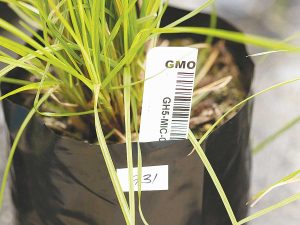Another Windfall for Fonterra Farmers, Unit Holders
Fonterra farmer shareholders and unit holders are in line for another payment in April.
 Two executives say the government decision to have submissions for the controversial Gene Technology Bill fall over the Christmas and holiday period "reeks of secrecy".
Two executives say the government decision to have submissions for the controversial Gene Technology Bill fall over the Christmas and holiday period "reeks of secrecy".
With less than a week to go before submissions close on the Government’s controversial Gene Technology Bill, two agribusiness executives - John Greenberg and Michael Henne - are calling on Fonterra to demand an extension to the submission period.
In an open letter, the two executives from farm technology company Hyprecision say the government decision to have the submission period for the contentious bill fall over the Christmas and holiday period “reeks of secrecy”.
“But here we are, less than eight weeks later, staring down a 17 February deadline to submit our comments on a proposal that could turn our dairy industry upside down,” they say. “It’s a slap in the face to every farmer who makes this nation prosper.”
The Government says the bill would enable the safe use of gene technology and regulated organisms in New Zealand.
Per the submission website, the government’s intention with the bill is to establish a new regulatory framework for gene technology and genetically modified organisms (GMOs).
Greenberg and Henne say they aren’t arguing for or against GMOS.
“That conversation deserves careful study and broad public input,” they say. “But who has the time or resources to do that right now?”
They say that farmers have only just returned from holiday, and many are already buried in the day-to-day demands of running their businesses.
“That’s on top of meeting regulations already pumped out by Parliament. To slam us with a Bill that could rewire our entire industry on eight weeks’ notice is abjectly insulting and completely disregards the spirit of fair governance that all Kiwis value.”
The pair want Fonterra to use its influence to insist that the Government extend the submission period.
“Our cooperative wields immense influence over our nation’s economy and, we should remember, is owned by thousands of shareholders who will bear the brunt of any shifts in policy,” they say.
“The CEO of Fonterra, Miles Hurrell, must publicly demand a 90-day extension for public comment on the Bill.”
“We need to know exactly what we’re signing up for. Genetic modification might offer benefits in terms of efficiency or resilience, or it might threaten our single most important market advantage, disrupt export relationships, and cash us out to international big ag corporations.”
Henne and Greenberg say they are concerned that farmers won’t be able to develop informed opinions on the bill because of the timing of its announcement.
“The time for polite requests has passed,” they say.
“We need Fonterra, our cooperative, to stand up and demand a 90-day extension on the comment period. It’s the bare minimum required to ensure that this Bill is fully understood by those who will be most affected by it.”
“Fonterra’s leadership must publicly insist on it. And if the government refuses, let them face the backlash from thousands of dairy farmers who are tired of being sidelined and patronised.”
The Meat Industry Association of New Zealand (MIA) today announced that Chief Executive Officer Sirma Karapeeva has resigned from the role.
The winners of the 2026 Hawke’s Bay/Wairarapa Dairy Industry Awards were announced at the annual awards dinner held at Copthorne Solway Park in Masterton on Thursday evening.
Environment Southland is welcoming this week’s decision by the Environmental Protection Authority (EPA) to approve the release of Blaptea elguetai, a leaf‑feeding beetle that will help control the highly invasive Chilean flame creeper.
This March, the potato industry is proudly celebrating International Women’s Day on 8 March alongside the International Year of the Woman Farmer, recognising the vital role women play across every part of the sector — from paddocks and packhouses to research, leadership, and innovation.
Fruit trader Seeka posted a record profit and returns to shareholders in 2025.
Recent weather events in the Bay of Plenty, Gisborne/Tairawhiti, and Canterbury have been declared a medium-scale adverse event.
OPINION: Staying with politics, with less than nine months to go before the general elections, there’s confusion in the Labour…
OPINION: Winston Peters' tirade against the free trade deal stitched with India may not be all political posturing by the…